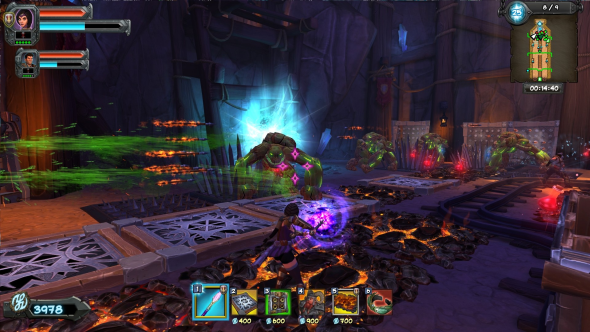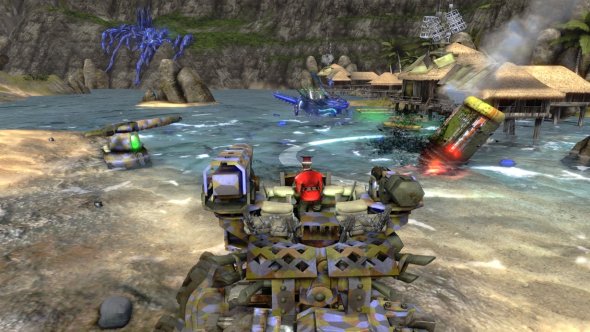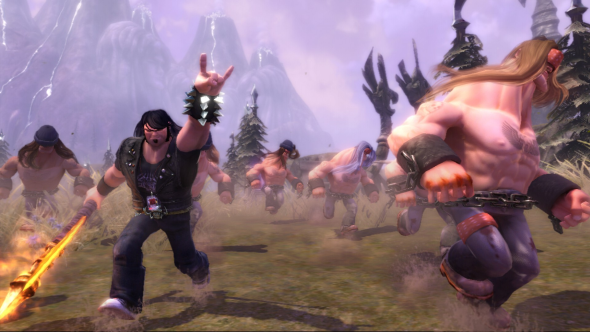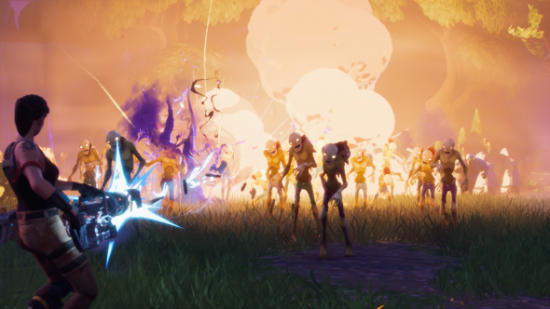Fortnite is out tomorrow! It’s a third-person shooter with… hmm. No. It’s more of a crafting and survival game that… nope, that’s not quite right either. It’s tower defence but, y’know, not.
Related: the finest sandbox games on PC.
There isn’t really a name for the genre that Fortnite belongs to. And yet, I know exactly what it is. It’s part of a surprisingly long lineage of cartoony, hodge-podge action games that enthusiastically pull ideas from their peers in real-time strategy. Fortnite and its friends are hybrids that borrow bits of other formulas, just as MOBAs did from StarCraft and Telltale from point-and-click adventures. But as with Dota and The Walking Dead, these games are distinct – and for that they deserve a name.
In Fortnite, you tend to start a mission by exploring a map and thwacking bits of the terrain until materials pop out. It’s this phase, and the fact that it was announced in 2012, that has seen the game compared to Minecraft over the years.
But after that phase you prepare for an incoming enemy horde. Often, you’re guarding an important object, or a group of survivors, and building around that central kernel using the materials you’ve gathered, like a bird protecting your young. At your disposal are not only walls and towers but traps and turrets, which you use to build chicanes and funnel the dead through a carefully curated series of floor spikes and electric jolts. Or, at least, that’s what I do. It’s an impulse learned entirely from Orcs Must Die!.
The Orcs Must Die! series has suffered a messy transition into the current generation of games. Its current iteration, Unchained, began with a focus on MOBA-influenced PvP. It wasn’t great. By the time the devs realised this and got the game back on course it had lost its time in the spotlight. But the previous two entries, and in particular 2012’s co-op Orcs Must Die! 2, turned tower defence into third-person action with anarchic flair.

As in Fortnite, you’d spend a little while preparing your defences in Orcs Must Die!. And, as in Fortnite, you weren’t ordinarily rushed about it. You’d be given plenty of information – the areas your enemies would spring from, and the route they’d take to your door – and as much time as you needed to lay an elaborate course of lethal slapstick obstacles. Imagine Peter Jackson’s Home Alone.
There was real strategy there, as you’d expect from a studio formed by Age of Empires alumni. But because you met the horde yourself on the frontlines, that strategy was half-buried beneath button-mashing glee. It felt a world away from the clicks-per-minute coldness the RTS genre can sometimes succumb to.
Out the same year was Double Fine’s Iron Brigade. There must have been something in the water in 2011, because it took a similar tack: third-person tower defence in which you called down turrets and planted mines, while ranging the map in a mech-like mobile trench. Iron Brigade took place in a First World War extended by television-powered monsters, and had an art style inspired by men’s magazines of the ‘40s and ‘50s – all cigar-chomping adventure and camaraderie. Like its stablemates in the Genre With No Name, it was very silly indeed.

But the action was intense, and as in Orcs Must Die!, you often couldn’t see the battlefield for the baddies. You’d become too absorbed in the battle on one side of the map and have to hurry over to another at-risk area as fast as your trench’s legs would carry you. The vibe was one of constant fire-fighting, and it felt good. Different.
What’s fascinating is that there’s history there. When Double Fine released Brütal Legend, they suffered a backlash – what had appeared to be a hack-and-slash third-person action game was, in fact, designed to couple “the brawn of an action game and the elegance of an RTS.”
“We learned early on in our relationship with Vivendi that RTS was a naughty word in the console space, so we stopped calling it by that name and, by extension, so did Electronic Arts – positioning the game largely as an action title in the marketplace,” former Double Fine COO Caroline Esmurdoc explains.

In other words, there was no name for the thing that Brütal Legend was, and it struggled as a result.
And yet, even Brütal Legend’s feature set had precedent. Nine years earlier, Planet Moon’s Giants: Citizen Kabuto launched to critical acclaim. Like Brütal Legend, it was a comedy adventure that sometimes staged pitched battles. And in those battles you’d build and manage a base, upgrading your powers while personally fending off attacks. If you want to go back still further, you can: months before that, Planet Moon’s former colleagues at Shiny put out Sacrifice, a third-person RTS that plonked you at the head of a throng of fluttering, slithering magical creatures. It’s all there on GOG: a full, forgotten corner of PC gaming that never got its Kickstarter revival.
Despite Double Fine’s ambitions, inelegance is a defining trait of these games. In practically all of them, that more intimate third-person perspective makes it impossible to effectively keep track of what’s going on beyond your field-of-view, or to optimise your building or production in the way that diehard RTS fans would like. Often they’ve failed to match the high production values of the best third-person action games, or proven unfocused. Fortnite isn’t exempt from that latter trend: it’s drowning in confusing and unnecessary progression systems. But to a certain kind of player, none of that matters once you’re slotting together staircases and hatching grand plans to scupper the horde’s advance.

These messy, magnificent games have something else in common, too. By and large, they don’t sell. None of the games named here have sequels, and Giants designer Nick Bruty’s attempt to crowdfund a successor failed, sadly. Perhaps the instincts of Vivendi are right, and these ideas are a little too idiosyncratic, a touch too strange, for the mass market. Hopefully, Fortnite, with the full backing of a self-published Epic Games, will prove them wrong. Either way: they’d have a better shot if we gave them a name, don’t you think?
I’ll start: Fortlikes.
Fortnite comes out tomorrow in Early Access. It’s available through Epic’s game launcher.
